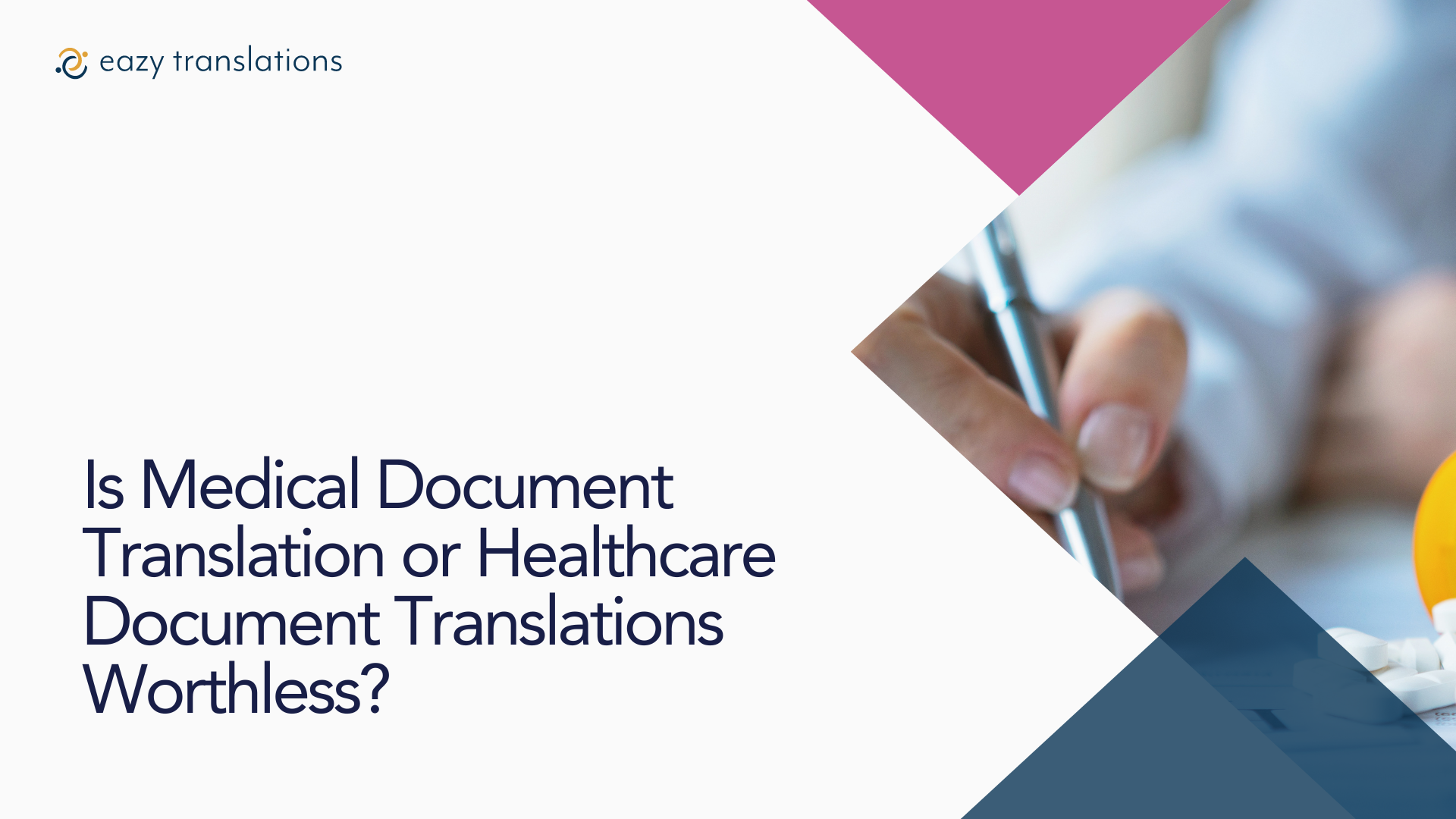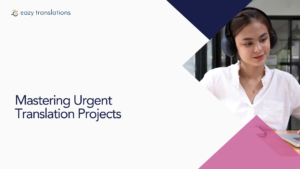In a world where medical terminology can be confusing in your native language, imagine trying to understand it in a foreign one. You might wonder: Are healthcare translation services, medical translation services, and healthcare translations truly valuable, or are they just another line item on a hospital bill? Let’s dissect this question with a mix of humor, curiosity, and a whole lot of facts.
Contents
- 1 What Are Healthcare Translation Services, and Why Do They Matter?
- 2 Are Machine Translations Up to the Task?
- 3 What’s the Cost of Poor Healthcare Translations?
- 4 How Do Healthcare Translation Services Enhance Patient Care?
- 5 Why Not Just Use Bilingual Staff?
- 6 How Can You Ensure Quality in Healthcare Translations?
- 7 Conclusion: Are Healthcare Translation Services Worth It?
What Are Healthcare Translation Services, and Why Do They Matter?
- What’s in a Name? – When we talk about healthcare translation services, we’re referring to the specialized translation of medical documents, patient records, pharmaceutical information, and other healthcare-related materials from one language to another. This might sound straightforward, but consider the precision required: translating “headache” is one thing; translating “polymyalgia rheumatica” is another story altogether.
- Life and Death Decisions – Imagine you’re in a foreign country, hospitalized with a serious condition. Your life could depend on how well the medical staff understands your medical history, allergies, and current medications. A mistranslation here could lead to wrong treatment, allergic reactions, or worse. Healthcare translation services ensure that medical professionals and patients communicate accurately, regardless of language barriers.
- Legal and Ethical Obligations – Healthcare providers have legal and ethical obligations to ensure patients understand their medical conditions and treatment options. This means providing accurate translations of medical documents. Mistranslations could lead to lawsuits, lost trust, and, most importantly, harm to patients. Thus, medical translation services aren’t just nice to have; they’re essential.
Are Machine Translations Up to the Task?
- The Rise of Machine Translation
With the advancement of technology, machine translations are becoming increasingly popular. Services like Google Translate are handy for quick translations, but can they handle the complexity of medical documents?
- When Machines Go Wrong
Let’s be honest: machine translations are impressive, but they’re not foolproof. Medical terminology is highly specialized. A machine might translate “mild hypertension” as “gentle high blood pressure,” which sounds like it could be treated with a calming tea rather than serious medical intervention. Healthcare translations require a human touch to ensure accuracy and context.
- The Human Advantage
Professional healthcare translation services use skilled translators who understand both the source and target languages’ medical nuances. They can catch errors, interpret context, and ensure the translation is medically sound. Machines can assist but should not replace the expertise of human translators in medical contexts.
What’s the Cost of Poor Healthcare Translations?
- Dollars and Sense – Poor translations can cost a lot—both financially and in terms of human life. Misunderstandings due to poor translations can lead to incorrect treatments, prolonged hospital stays, and additional medical interventions, all of which increase healthcare costs.
- Real-World Examples – There have been documented cases where poor translations have led to catastrophic outcomes. For instance, a misinterpretation of “intoxicado” (which means poisoned in Spanish) as “intoxicated” (drunk) led to a young man being treated incorrectly in a Miami hospital, resulting in severe brain damage. This tragic example underscores the critical importance of accurate medical translation services.
- Beyond the Bottom Line – While financial costs are significant, the human cost is immeasurable. Patients deserve to understand their health conditions and treatment plans. Proper healthcare translations ensure they receive the correct information, leading to better health outcomes and trust in the healthcare system.
How Do Healthcare Translation Services Enhance Patient Care?
- Bridging the Communication Gap – Healthcare translation services act as a bridge between healthcare providers and patients who speak different languages. This bridge is crucial for effective communication, ensuring patients fully understand their diagnoses, treatment options, and medication instructions.
- Cultural Sensitivity – Beyond language, understanding cultural nuances is essential in healthcare. Professional translators are trained to be culturally sensitive, which helps in explaining medical procedures and treatments in a way that is respectful and comprehensible to patients from diverse backgrounds.
- Improving Patient Compliance – When patients understand their treatment plans, they are more likely to comply with medical advice. Accurate translations of instructions, consent forms, and discharge summaries are vital for ensuring patients follow their prescribed treatments correctly, leading to better health outcomes.
Why Not Just Use Bilingual Staff?
- The Bilingual Myth – Having bilingual staff can be helpful, but it’s not a complete solution. Being fluent in two languages doesn’t necessarily equate to being able to accurately translate medical documents. Medical translation requires specialized knowledge of medical terminology, which goes beyond everyday bilingual proficiency.
- Training and Expertise – Professional healthcare translators undergo rigorous training to understand medical language in both the source and target languages. They are skilled in maintaining the integrity and confidentiality of sensitive medical information, a competence that bilingual staff may lack.
- Avoiding Burnout – Relying on bilingual staff for translations can also lead to burnout. These staff members often have their own primary responsibilities, and adding translation duties can be overwhelming. Professional healthcare translation services ensure that translations are handled by experts, allowing bilingual staff to focus on their main roles.
How Can You Ensure Quality in Healthcare Translations?
- Certification and Accreditation – One way to ensure quality is by using certified translation services. Look for agencies that are accredited by professional bodies such as the American Translators Association (ATA) or the International Medical Interpreters Association (IMIA). These organizations set high standards for translation quality and professionalism.
- Continuous Training – The medical field is constantly evolving, and so should the knowledge of medical translators. Continuous training and education are crucial for translators to stay updated with the latest medical terminologies and practices.
- Quality Assurance Processes – Reputable healthcare translation services implement rigorous quality assurance processes, including peer reviews and back translations (translating the document back into the original language to check for consistency). This ensures that translations are accurate and reliable.
- Utilizing Technology – While we’ve discussed the limitations of machine translation, technology can still play a role in ensuring quality. Translation memory software helps maintain consistency across documents, and terminology databases ensure the correct use of medical terms. When used alongside human expertise, technology can enhance the quality and efficiency of healthcare translations.
Conclusion: Are Healthcare Translation Services Worth It?
Absolutely. Healthcare translation services, medical translation services, and healthcare translations are far from worthless; they are indispensable. Accurate translations ensure clear communication between healthcare providers and patients, leading to better health outcomes, increased patient trust, and compliance with legal and ethical standards.
In a world where miscommunication can mean the difference between life and death, investing in professional healthcare translation services is a no-brainer. So, the next time you come across a translated medical document, remember the meticulous work behind it and appreciate the role it plays in safeguarding patient health.
Embrace the value of healthcare translations, and let’s ensure that language barriers never stand in the way of excellent healthcare. And if you’re ever in doubt, remember the old adage: It’s better to be safe (and well-translated) than sorry.





